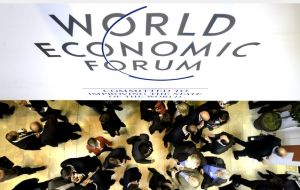MercoPress. South Atlantic News Agency
How the Americas can secure much needed ‘game-changing’ global expansion in higher education
 Mulder, following on the steps of MIT with the OpenCourseWareConsortium
Mulder, following on the steps of MIT with the OpenCourseWareConsortium  Over the next decade the global economy will need to create 600 million new jobs to preserve social cohesion and ensure sustainable growth says WEF
Over the next decade the global economy will need to create 600 million new jobs to preserve social cohesion and ensure sustainable growth says WEF By Anka Mulder - Over the next decade, it is estimated by the World Economic Forum (WEF) that the global economy will need to create some 600 million new jobs to preserve social cohesion, and ensure sustainable growth. In the midst of ongoing economic fragility across much of the world, this poses a monumental challenge, and will thus be one of the topics discussed at WEF annual meeting in Davos later this month.
Education is key to delivering this agenda. Human advancement and development has always been driven by knowledge, and by our capacity to impart this, cumulatively, to succeeding generations. And, this is perhaps truer now than ever:
• In developed economies, such as Europe and North America (where millions of manufacturing and low-skilled jobs have been lost since 2008), recovery will be powered -- in large part -- by creation of highly skilled employment opportunities, many of them requiring degrees.
In high growth-economies, including China, India, and Brazil, there are rapidly rising numbers of higher education students. In India, for instance, the ambition is to increase the portion of the population with a university education from 12% to 30% in 2025 (from 12 million to over 30 million students).
• In other developing markets, like Africa and the Middle East, human capital development is also crucial to the next generation of economic growth.
But as the global pool of education and knowledge continually expands, and demand for access to it increases, traditional means of sharing and disseminating it are under unprecedented strain. UNESCO estimates that, by 2025, there will be at least an additional 80 million more people than now seeking higher education.
To meet this ‘game-changing’ new demand through conventional means would require construction, each and every week for the next 12 years, of three universities/higher education colleges accommodating 40,000 students. That’s simply not going to happen, especially given reduced government budgets in much of the world.
So how can this issue therefore best be addressed?
Much of the answer lies in realising the full potential of digital technology and the internet. They already provide access to vast resources of information, most of it free. But not all this data is reliable, and even credible information is only a stepping stone to real knowledge.
That’s why, a decade ago, Massachusetts Institute of Technology made all its educational materials available online -- for free. About 300 educational institutions have followed since, including Delft University where I am Secretary General. Together they created the OpenCourseWareConsortium, which now provides some 21,000 courses and has some 360 million online visits per year.
Instead of searching the internet for information, learners across the world can now access focused courses, along with support materials such as sample tests that gather, assess, and organise information into coherent blocks of knowledge. This has played a pioneering role in what is nothing less than a global educational revolution.
Despite the major benefits of providing educational materials online, this development has not been without critics. Some, for instance, scorn online learning as exclusively ‘virtual’, but for many (if not most) young people, digital communication is the new reality.
They increasingly video-chat via platforms such as Skype; use web-based forums to search for and share useful information; connect with friends via social media like Facebook; purchase their goods online; and play games, albeit to their parents irritation!
Other critics have justifiably pointed out that online programmes are often not interactive and focus too much on content. And that content cannot be equated with knowledge and that learning needs interaction between students and teachers.
However, as pressure on higher education intensifies, the reality of campus-based study is that teachers often find themselves mere content providers to hundreds of students in a lecture hall, particularly at the undergraduate level. The personalised, interactive learning experience that critics of online education uphold as an ideal is simply not what many students get on-campus today.
Moreover, in the last two years, major steps have been taken in open and online higher education that deal with exactly the questions of how to enable the learning process, provide structure and facilitate interaction on line.
At present, almost every aspect of education can be found online: content, homework, interaction among students, automated feedback, testing and certification. Good examples are Stanford’s and MIT’s MOOCs (Massive Open Online Courses) which have attracted around 100,000 students per course.
These are all top level quality courses. And, on top of content they include structure -- a starting and finishing date for everybody joining -- homework, a community and a final test.
This example has been followed by many other institutions. For instance Open Study and the OpenCourseWare Consortium have provided interaction by building student communities around online materials, the largest one being Mathematics, with 83,000 students. They have also started granting informal certificates to students who finish a course. EdX, a joint MOOC platform of MIT and Harvard, is doing the same and the first US university has already decided to formally recognise edX certificates.
Taken overall, digital technology and the internet are thus key to tackling several of the grand global challenges in education, including: allowing people from around the world, especially in developing countries, access to educational materials that they would not otherwise have; circumventing the rising cost of ‘traditional’ education in many (especially developed) countries; accommodating the massively increasing number of students seeking higher education; and bridging the gap between education and the world of new generations of students.
As with all upheavals, the full implications of this revolution are not easy to predict. However, it can only be positive for human development and advancement across the globe at a time when both are badly needed to help ensure social cohesion and sustainable growth.
(*) By Anka Mulder, Secretary-General of Delft University and Global President of OpenCourseWare




Top Comments
Disclaimer & comment rules-

Read all commentsOnline education ?
Jan 10th, 2013 - 06:43 pm 0what a joke !
first of all, there should be new developed ones instead of present moronic,useless softwares.
Commenting for this story is now closed.
If you have a Facebook account, become a fan and comment on our Facebook Page!